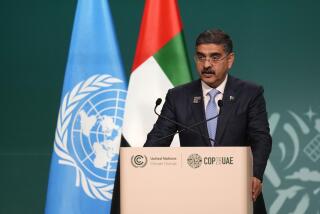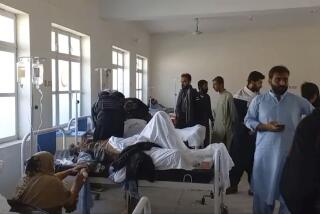76 dead in attacks on Pakistan mosques
- Share via
Reporting from Islamabad, Pakistan — — Militants armed with grenades, guns and suicide vests Friday stormed two mosques in Lahore belonging to a minority sect, killing at least 76 people in coordinated attacks that illustrate the vulnerability of groups considered outside the mainstream of Pakistani society.
The Ahmadi sect is one of the country’s most beleaguered minority groups. Numbering about 4 million, they consider themselves Muslims but believe their late-19th century founder, Mirza Ghulam Ahmad, was a prophet of God. That is heresy for most Muslims, who believe Muhammad was the last prophet. Ahmadis suffer severe discrimination in Pakistan and are legally barred from calling themselves Muslims.
The attacks occurred during Friday prayers as Ahmadis filled two of the sect’s mosques in the neighborhoods of Model Town and Garhi Shahu.
In both cases, militants were able to easily get inside the mosques, where they opened fire with guns and threw grenades at terrified worshipers. At the Garhi Shahu mosque, two of the attackers detonated suicide vests in the main hall. At least 91 people were injured.
An Ahmadi elder said the Model Town mosque had gotten threatening phone calls and had reported the threats to police.
“We asked the government and police several times to enhance our security, but we didn’t get anything,” said man, who spoke on condition of anonymity because he feared retribution.
Geo TV, a Pakistani satellite channel, reported that the Punjabi Taliban, a wing of the Pakistani Taliban comprising several Punjabi extremist groups, claimed responsibility for the attacks.
Punjab is Pakistan’s wealthiest and largest province, but it is rife with violent sectarian groups that prey on religious minorities such as Ahmadis, Christians and Shiite Muslims. In April, Ahmadis were subject to a wave of kidnappings and killings in the central Punjabi city of Faisalabad.
The extremist groups, which include Jaish-e-Mohammed, Lashkar-e-Jhangvi and Sipah-e-Sahaba, have been officially banned for years, but they operate freely throughout Punjab province. Experts say the provincial government, led by the country’s largest opposition party, the Pakistan Muslim League-N, has shied away from cracking down because those militant groups represent large constituencies that provide political support.
More recently, members of these groups have joined forces with the Pakistani Taliban and have expanded their focus beyond sectarian targets to include attacks on military and government buildings. The 2009 siege of the Pakistani army headquarters in Rawalpindi, which killed 19 people, was led by a former Lashkar-e-Jhangvi member.
Asma Jahangir, head of the Human Rights Commission of Pakistan, said in a statement Friday that the watchdog group “is concerned over the spread of sectarian extremism, and considers it a huge threat to the security of Pakistani society.”
“For more than a year, the Human Rights Commission of Pakistan has been giving intimations to the Punjab government about threats being made to the Ahmadi community,” Jahangir said. “Though the Punjab government had apparently taken some steps to enhance security, they were not enough to stop well-planned and comprehensive terror attacks. That was proved by the attacks Friday.”
Witnesses said one of the three assailants at the Model Town mosque killed a security guard at a front gate and then ran inside while another attacker shot through a window at the back of the building to get in. Hundreds of worshipers ran for cover as the militants fired indiscriminately.
One worshiper, who gave only his first name, Shahzad, said he and others hid on an upper floor as gunfire rang out in the main hall.
“They were throwing grenades and firing everywhere,” Shahzad said. “Our leader told us to stay calm and asked us to pray quietly. I was very afraid and very sure that the terrorists would come upstairs and kill us.”
Shahzad said that when he looked down on the main floor, he saw several worshipers lying in pools of blood, many of them with gunshot wounds to their heads. Nearby, a militant clutching a Kalashnikov assault rifle lay seriously injured, gasping for breath.
Authorities said two of the Model Town attackers were captured. The third assailant was killed by security forces. The death toll at the mosque stood at 24 as of Friday evening. At least 33 people were injured.
After the attack, worshipers formed a chain around the compound to prevent journalists and outsiders from entering. They were angered by what they said was a delayed response by police, though there is a police station near the mosque. The Ahmadi elder said police arrived about 50 minutes after worshipers called for help.
About the same time as the Model Town attack, six militants stormed into the Ahmadi mosque in the Garhi Shahu neighborhood, which had about 1,000 worshipers. Witnesses said they saw the attackers running inside, armed with assault rifles and lugging duffel bags.
“People outside began running for cover and shouting, ‘There are men with guns!’ ” said Abdul Qayyum, a neighborhood 9.
Once inside, the gunmen began firing wildly and hurling grenades, witnesses said. Two of the attackers detonated suicide vests.
“The bullets seemed to be coming from all sides,” said worshiper Abdul Rauf. “Everyone was panicking, racing into bathrooms or up the stairs to find a place to hide. There were dead bodies and blood everywhere.”
Two of the gunmen fired at police from a minaret. One later descended and detonated his suicide, said Khusro Pervez, Lahore’s top administrative official.
After a three-hour standoff, police regained control of the mosque and arrested two of the militants.
In addition to the three attackers who blew themselves up, one was killed by security forces, said Shuja Khanzada, an advisor to Punjab provincial Chief Minister Shahbaz Sharif.
Authorities said 52 people were killed and 58 injured in the Garhi Shahu attack.
Speaking to reporters in Lahore, Sharif, brother of PML-N party chief Nawaz Sharif, condemned the attacks.
“I believe this brutal act has reminded the nation once again that Pakistan can never achieve its desired goals until this kind of extremism is eliminated,” Sharif said.
A special correspondent in Lahore contributed to this report.
More to Read
Sign up for Essential California
The most important California stories and recommendations in your inbox every morning.
You may occasionally receive promotional content from the Los Angeles Times.










